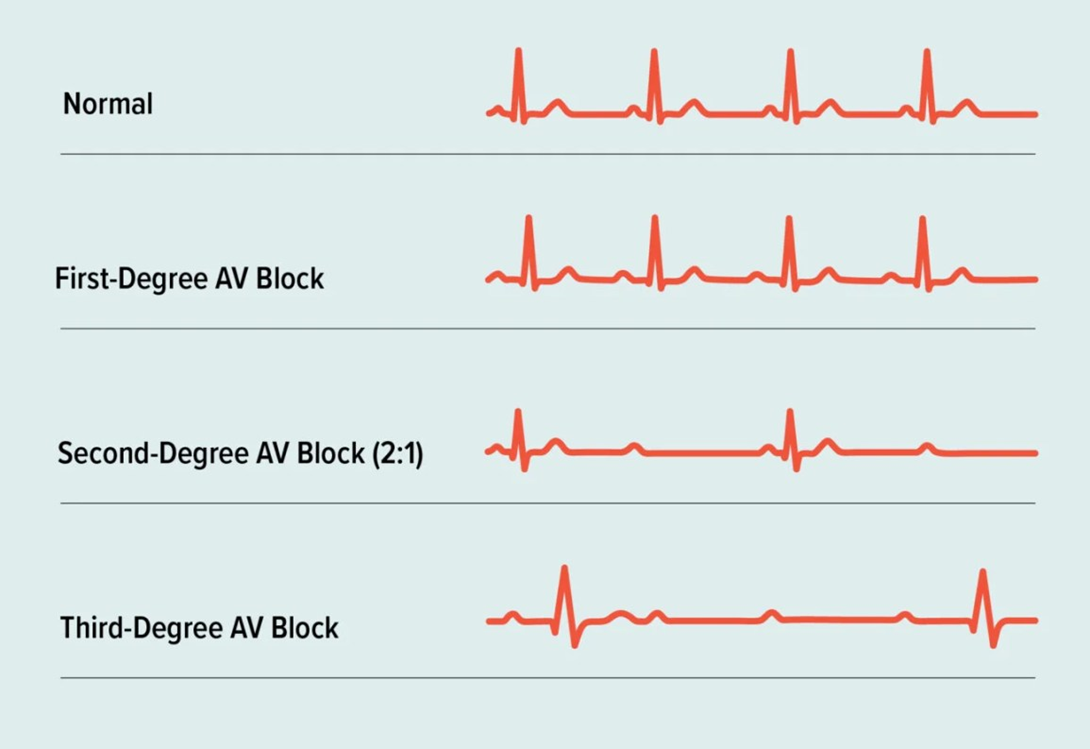A nurse is caring for a client who has been prescribed parenteral lidocaine. Before administering the medication, the nurse should review the medical record for which condition?
Glaucoma.
Heart block.
Gastric ulcers.
Diabetes mellitus.
The Correct Answer is B
Choice A reason: Glaucoma is not directly related to the administration of lidocaine, as it does not affect intraocular pressure or the pathophysiology of glaucoma.
Choice B reason: Heart block is a type of arrhythmia where the electrical signal is delayed or blocked entirely. Since lidocaine affects cardiac conduction, it is crucial to review the medical record for heart block before administration.
Choice C reason: Gastric ulcers are not typically a concern when administering lidocaine, as it does not have gastrointestinal effects when given parenterally.
Choice D reason: Diabetes mellitus is not a contraindication for lidocaine administration; however, monitoring blood glucose levels is always important in diabetic patients receiving any medication.

Nursing Test Bank
Naxlex Comprehensive Predictor Exams
Related Questions
Correct Answer is C
Explanation
Choice A reason: Obtaining vital signs every 2 hours is standard postoperative care but does not specifically address the needs of a client recovering from retinal detachment surgery.
Choice B reason: While deep breathing and coughing exercises are important postoperative interventions, they are not specific to the care of a client after retinal detachment surgery.
Choice C reason: Providing an eye shield for sleep helps to protect the eye from accidental rubbing or pressure, which is critical after retinal surgery.
Choice D reason: Teaching a family member to administer eye drops is important for ongoing care but is not as immediately critical as protecting the eye from injury.
Correct Answer is D
Explanation
Choice A reason: Reviewing the medical record for the date of insertion is important but does not address the immediate concern of pain or potential complications at the IV site.
Choice B reason: Applying ice and then a warm compress may be used for phlebitis or infiltration, but if the client is experiencing pain, the priority is to address the potential for complications.
Choice C reason: Documentation is a necessary step, but it should not be the first action taken when a client reports pain at the IV site.
Choice D reason: If the IV site is painful, it may be indicative of infiltration, phlebitis, or another complication. The nurse should discontinue the painful IV and insert a new one at a different site to prevent further discomfort and potential harm to the client.
Whether you are a student looking to ace your exams or a practicing nurse seeking to enhance your expertise , our nursing education contents will empower you with the confidence and competence to make a difference in the lives of patients and become a respected leader in the healthcare field.
Visit Naxlex, invest in your future and unlock endless possibilities with our unparalleled nursing education contents today
Report Wrong Answer on the Current Question
Do you disagree with the answer? If yes, what is your expected answer? Explain.
Kindly be descriptive with the issue you are facing.
